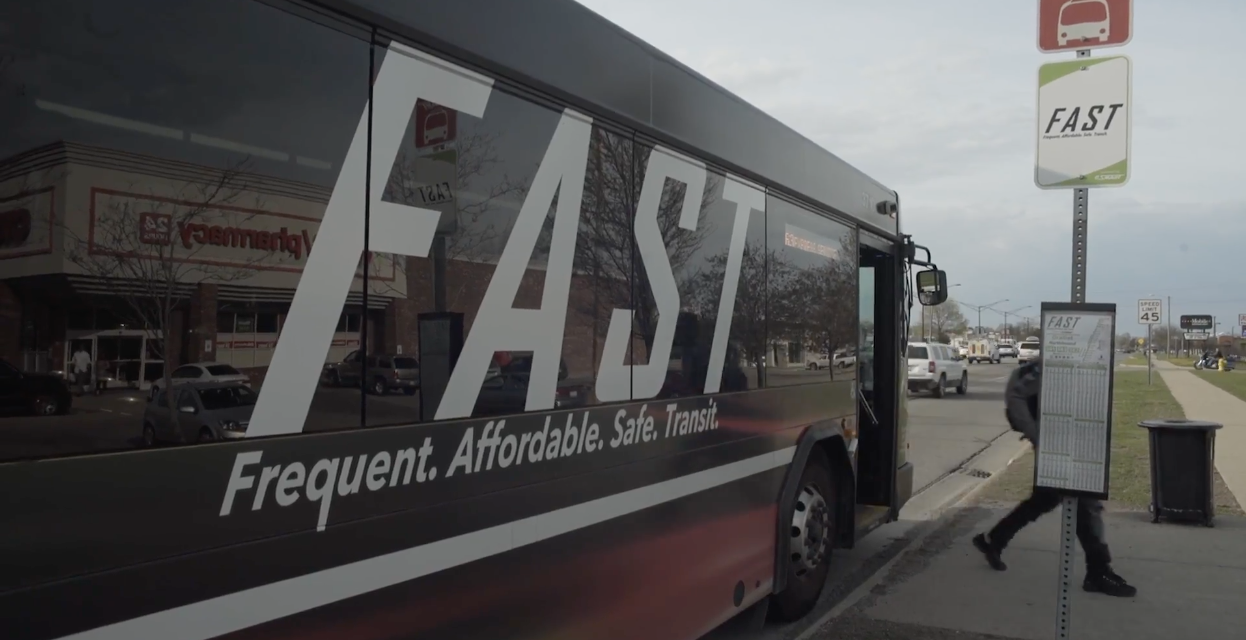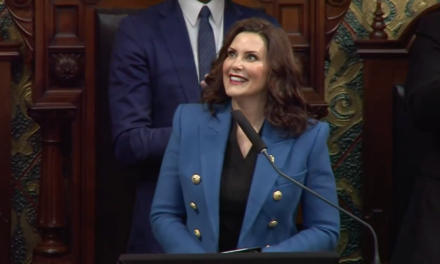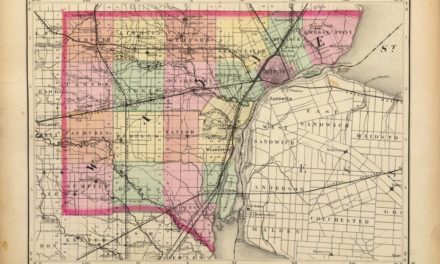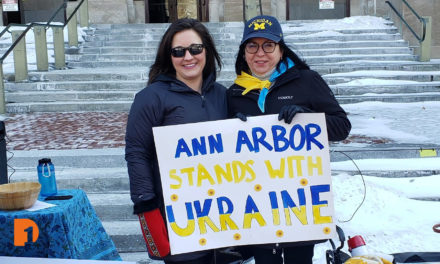In late June, DJC Partner Bridge Magazine’s Chastity Pratt Dawsey reported that the Detroit regional mass plan was dead for 2018.
Though a regional transit plan will not be on the ballot for November, the debate about developing more mass transit in the region is still alive. WDET’s Sandy Svoboda asked each of the candidates how their administrations would develop mass transit not only in Southeast Michigan, but also rural areas in the state.
Brian Calley (R):
Sandra Svoboda: I am interested in transit. How would your administration approach transit policy both for southeast Michigan with what is going on with the Regional Transit Authority, and also some of the rural areas of the state?
Brian Calley: Let us talk about southeast Michigan here first. I think the whole discussion needs a game-changer. Asking the same old question over and over again, I do not think you are going to get a big difference in the outcome or the answer that the public gives. We are in the middle now of this revolution in mobility. There are autonomous and connected vehicles, but also just everything about transportation. It is how vehicles and infrastructure work, are owned, and operated. What I would love to see happen now is to insert a first in the world advancement in taking this technology that is being developed and deploy it to solve transit problems in our state. Give people a reason to be excited about it.
It is something bigger than a fixed line transit system. If you need to go on this route and you can meet up with our schedule, here is your option. I just do not think that people in Michigan – they have not been willing to pay for that in the past. I do not think they are going to be as willing to pay for that in the future. If you were to combine that with a real mobility solution that advanced the technology that we are driving here in Michigan, I just think people would be really excited about that. We could further solidify being the international leader of the future of mobility.
Patrick Colbeck (R):
Sandra Svoboda: Let’s stay on mobility but in terms of public transit. We’ve got a diverse state between the Upper Peninsula and the Lower Peninsula, Detroit, and other urban areas with population density and mass transit systems. So I’d like to hear a little bit about your specific plans both for the urban areas and regional transit, specifically in Southeast Michigan and then also the rest of the state and rural areas and what might be in the works for those regions.
Patrick Colbeck: All right. Well, I’m not a fan of the Regional Transit Authority in Michigan, in Southeast Michigan, in particular, right now. And part of the reason is because they never really solved the core problem. They just kind of put another layer on top of two existing.
Sandra Svoboda: What’s the core problem?
Patrick Colbeck: The core problem is legacy costs associated with those and delivering effective services. And frankly, when you start talking about mass transit, there are major disruptors out there that if the state goes in and puts in some major investments in infrastructure along those lines, where does that leave room for the next Uber of the world or the Lyft of the world that actually has an innovative way of maybe delivering some of these services in a way free from government entanglement? And they actually provide better quality services that meet the needs of consumers.
So the idea of the state getting in the middle of that, I know in Europe over many, many years, frankly with a lot of assistance from the United States, they’ve got some pretty good mass transit systems that are put in place. And I love taking advantage of that when we have it in place, but we need to make sure that the people that are receiving the services are also the ones that are the ones that are paying for those services. And a lot of the proposal that I’ve seen to date set it up so that somebody else pays for it and somebody else receives the benefit.
Now this could be part of an overall plan to go off and help folks we were talking about earlier with child care and the idea of getting people transportation to work, effective transportation to work, and there might be some room in that context. But we’ve got to be careful about becoming too heavy handed as a state and investing heavily in that infrastructure because I think there’s a lot of innovative disruptors like the Lyfts and the Ubers out there that might have a different approach to it that might satisfy our needs better.
Jim Hines (R):
Sandra Svoboda: Do you think transit plays into that? We hear that a lot in the Detroit area. Younger people want transit to do not as much driving to get to and from work and other things; yet, we have a very diverse state, rural and urban areas that would inform any transit policy that you would have in the governor’s office. Could you speak to that issue?
Jim Hines: I think a transit system is very important. Now, is it mandatory? When you look at our young people, those that are in grad school and those that are going to be working at places like Amazon, they don’t want to drive. They want to get into that electric car, autonomous vehicle, and do their thing and have them take them to work. Transportation is critically important, and we’ve talked about mobility.
But the roads are the priority. We’ve gotten things out of order. So we’re talking about autonomous cars and electric cars. Do you want to drive a high-performance vehicle on any road in Michigan? And the answer is no, you don’t. So we’ve got to get the basics done. I consider our infrastructure, our education, and our jobs the building blocks for this state. The cornerstone of those three building blocks is education.
Because without the education, you’re just not going to be that successful. You may have a menial job, but you’re not going to get that high paying job.
Abdul El-Sayed (D):
Sandra Svoboda: Michigan is a very diverse state between urban areas and a lot of rural areas as well. So I am interested in your ideas for transit throughout the state a little bit specifically in Southeast Michigan with the RTA.
Abdul El Sayed: Yeah. I think the RTA is a good start. I think whoever the next governor is has got to be willing to put a shoulder in to making sure that we get regional transit invested in. I believe our Pure Michigan Infrastructure Bank provides the right tool, so that the State comes in with some skin in the game. Like I told you earlier, the biggest competition that we have right now is the competition for young talent. And young talent keeps leaving because we don’t offer the kind of lifestyle choices that young people are interested in. And those lifestyle choices often times are undergirded by the ability to move across different communities quickly. We don’t have that in Michigan. I honestly believe that mass transportation is mission critical for the future of our state and I am committed to getting it done.
Shri Thanedar (D):
Sandra Svoboda: We do have a diverse state in Michigan with suburban areas and a lot of rural areas, as well. So, as you think about transit between the RTA in Southeast Michigan and what the rest of the needs are for the State, what kinds of policies do you have planned?
Shri Thanedar: Again, my focus is on taking our infrastructure to the next level. And I believe the more investment we do in our infrastructure, the better our state is going to do from an economic prosperity. And mass transit is absolutely a big part of that. And like Steve’s question, you know, I would ask other counties to look at this as one big family. So, Oakland and Macomb need to chip in and we’re all in it together. And we all do good or we all come down.
And so, we need to contribute. And success of Detroit is very, very critical. Detroit is one of the most important cities in our state. And when Detroit succeeds, we all succeed. And it’s important that we have mass transportation. We need to ensure that we expand the bus routes, we bring in light rail, and we take our transportation to the next level. And that’s one of the factors for the Millennials to want to stay in our state and stay in our urban areas. And transportation will also help businesses want to move in because they have ready access to skilled employees.
And so, that’s my approach going to be. Not give money away in tax incentives to big corporations but invest that into our people, invest that into our communities, invest that into the facility improvement. And when we do that, that’s what’s going to increase our GDP, that’s what’s going to increase our economic activity.
Gretchen Whitmer (D):
Sandra Svoboda: Interested in talking about transit, especially as our state is so diverse in terms of urban, suburban, rural areas. I’d like to hear a little bit about transit policy for the entire state and also because southeast Michigan specific with the RTA issues.
Gretchen Whitmer: Yeah, so when I was in the legislature, I supported the RTA. I took the vote that helped get it moving so that the region could put it before voters. I was sad to see it not get passed and I was sad to see you know the more recent discussions about it. One of the things that I know is that if the state got back to fixing roads, perhaps that wouldn’t be the top issue that is keeping some leaders in the region from being able to consider this as a real necessity and really look to solving this problem. I know that there are people that live in the city of Detroit who work, whether it’s in Oakland County or in Romulus that need to take a couple of buses to get there. It’s a real hardship for people when they are applying for jobs because the question of how are you going to get here is asked.
We’ve got bad roads. We’ve got crazy cost of insurance. And lack of transit for people that is solid and reliable. That’s keeping hardworking people from getting into good paying jobs. Regional transit is very important. It is something that I do support. And it’s something that as governor, I’m going to work with the leaders of the county and Mayor Duggan and the county execs to get it done.
More on the Detroit Journalism Cooperative Gubernatorial Candidate Interviews:
This year, Michigan voters will be selecting a new governor, who will be facing important issues that will determine the health and vitality of the state for years to come.
The first step in the electoral process is the state primary on August 7, when the standard bearer for both the Democratic and Republican parties will be determined.
The Detroit Journalism Cooperative invited all major party candidates to the Detroit Public Television studio for individual, hour-long interviews with a panel of its reporters. The candidates received virtually the same questions and were able to respond at length, providing voters with a much more in-depth and contextual understanding of where each stood on the issues of importance to the state than they can glean from conventional coverage.
So please consider their opinions carefully and, most of all, vote!
Every candidate accepted the invitation to be interviewed except for Attorney General Bill Schuette.









